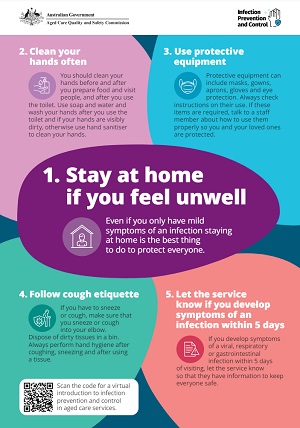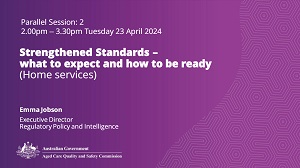Joint letter on Winter outbreaks to Board Chairs, Residential Aged Care Providers from the Chief Medical Officer, Professor Paul Kelly and Commissioner Janet Anderson PSM.
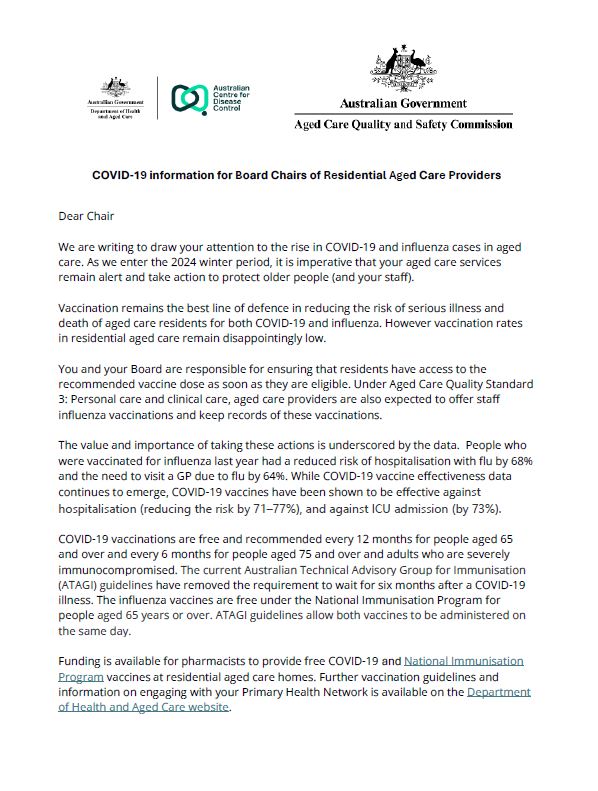
The partner information pack presents information for all people visiting and volunteering in residential aged care services. The resource includes information on the importance of infection prevention and control (IPC), the use of personal protective equipment (PPE), and changes in what you need to do if you visit during an outbreak.

This report is specifically for people receiving aged care and focuses on the experience of those using home services through Home Care Packages or through the Commonwealth Home Support Programme.
The report aims to help people to understand what to expect from their home services provider and sets out what to do if things are not going the way they want. The report includes information about aged care standards, data collected from thousands of complaints and useful tips for people receiving care.

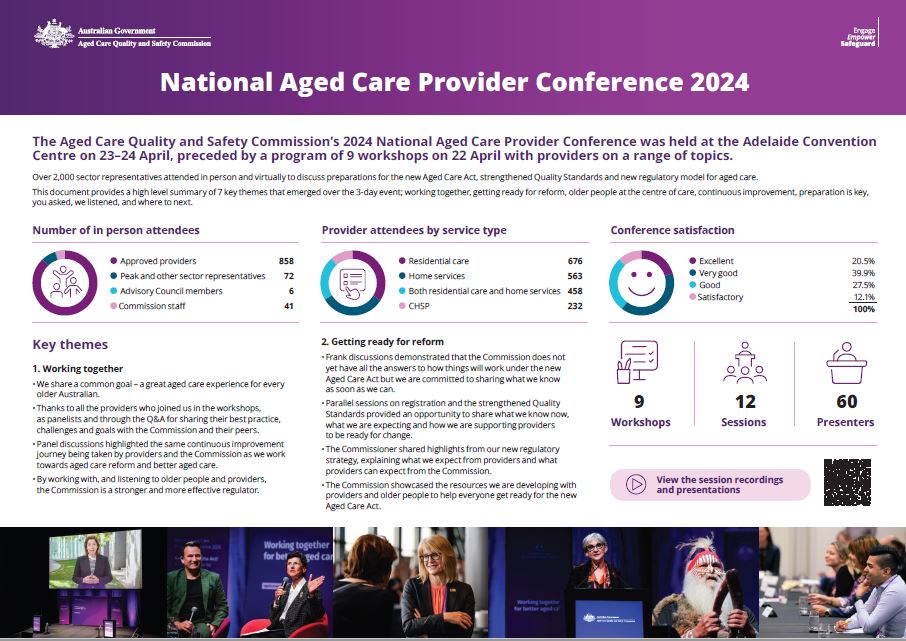
National Aged Care Provider Conference 2024. Towards excellence - aged care on the move, address and open forum by Janet Anderson, PSM Commissioner.

National Aged Care Provider Conference 2024. Parallel session 1: Provider registration unpacked - registration and renewal (Residential services). Presentation by Louise Macleod, Complaints Commissioner, ACQSC
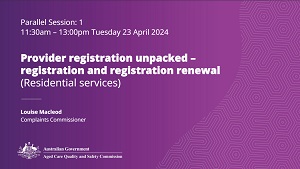
National Aged Care Provider Conference 2024. Parallel session 1: Provider registration unpacked - registration and renewal (Home services). Presentation by Anthony Speed, Executive Director, Quality Assessment and Monitoring, ACQSC.
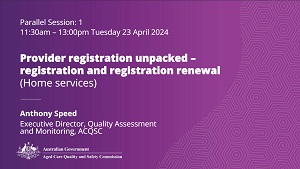
National Aged Care Provider Conference 2024. Parallel session 2: Strengthened Standards – what to expect and how to be ready (Residential Services). Presentation by Deputy Commissioner, Sector Capability and Regulatory Strategy Lisa Peterson PSM, ACQSC.
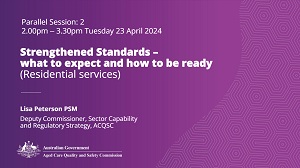
National Aged Care Provider Conference 2024. Parallel session 3: Governing bodies working with older people in the design of their care (Residential services). Presentation by Louise Macleod, Aged Care Complaints Commissioner, ACQSC.
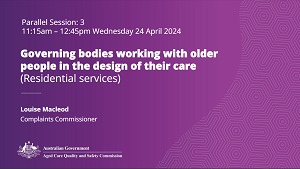
National Aged Care Provider Conference 2024. Parallel session 3: Governing bodies working with older people in the design of their care (Home services). Presentation by Executive Director, Approvals and Serious Incident Notifications Ann Wunsch, ACQSC.
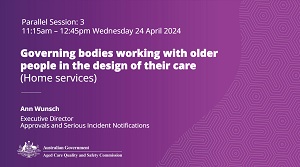
National Aged Care Provider Conference 2024. Parallel session 3: Governing bodies working with older people in the design of their care (CHSP). Presentation by Janet Anderson, PSM Commissioner.
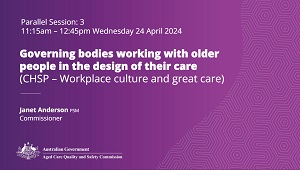
National Aged Care Provider Conference 2024. Closing Plenary: Bringing it all together – closing plenary with Commissioner Janet Anderson PSM, First Assistant Secretary, Quality Assurance, Department of Health and Aged Care Amy Laffan and pre-conference workshop representatives
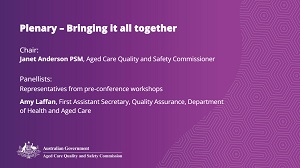
The strengthened Quality Standards pilot project final report outlines key insights, findings and lessons learnt from the pilot audits. The report will direct future work to be undertaken by the Commission in preparation for implementation of the strengthened Quality Standards and new audit methodology.
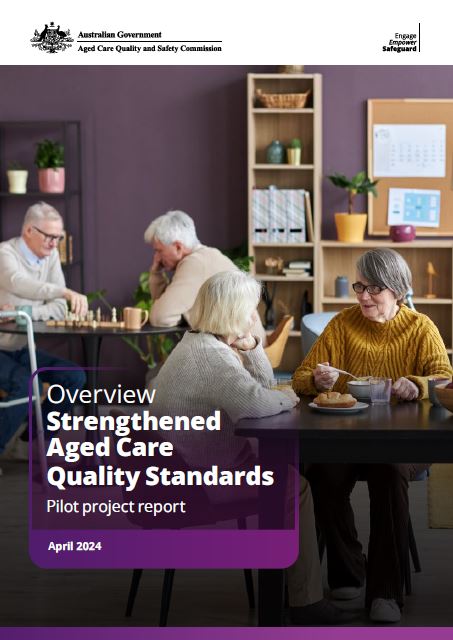
Use this discussion guide in consumer advisory body meetings to help start conversations and encourage ideas on important topics.

This quick survey is a reflection tool on urine dipstick practice in your facility.
Is there room for improvement?
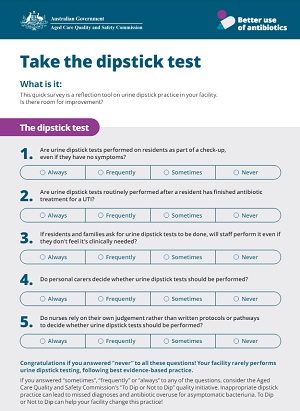
This visual abstract presents outcomes from a quality improvement project aimed at reducing low-value urine dipstick testing in aged care services. It included nurse education, implementing clinical pathways for UTI identification, and evaluating urinalysis practices and antibiotic prescribing. The findings demonstrate improved antibiotic prescribing appropriateness for UTIs over a 6-month follow-up period.
This resource may refer to information that will be updated from 1 July 2025 to align with the new Aged Care Act and Quality Standards.
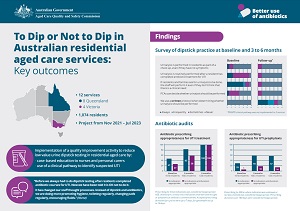
To Dip or Not to Dip (TDONTD) is a quality improvement intervention successfully implemented in UK and Australian aged care homes to improve UTI assessment and antibiotic prescribing appropriateness.
This implementation guide has been drawn from the experiences of homes and champions who have implemented TDONTD, along with feedback from aged care nurses and personal care assistants who have used TDONTD resources.

This huddle tool poster provides guidance on appropriate use of urine dipstick tests in older adults. It explains that asymptomatic bacteriuria (ASB) is common and not harmful, but that unnecessary antibiotic treatment can be. It suggests confirming urinary tract infections (UTIs) through clinical symptoms rather than dipstick results.
This resource may refer to information that will be updated from 1 July 2025 to align with the new Aged Care Act and Quality Standards.
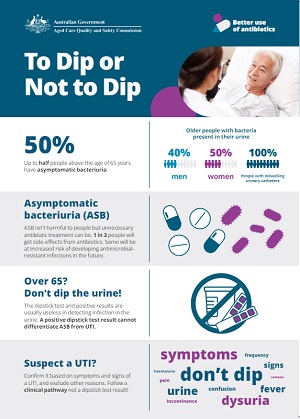
Infection prevention and control, also known as IPC, are the steps and processes that people can use to reduce the spread of harmful germs and bacteria. People who visit aged care services can help support IPC processes.
